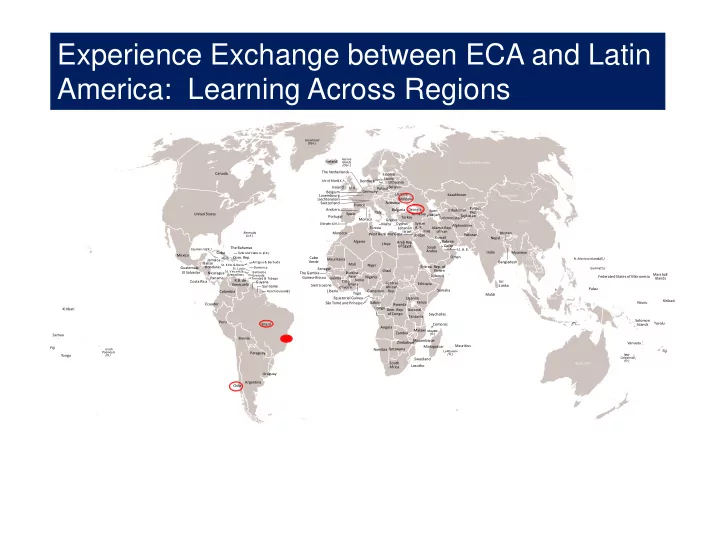

Experience Exchange between ECA and Latin America: Learning Across Regions Greenland (Den.) Faeroe Norway Iceland Islands Russian Federation (Den.) SwedenFinland The Netherlands Canada Estonia Latvia Russian Isle of Man ( U.K.) Denmark Lithuania Fed. Ireland Belarus U. K. Poland Germany Belgium Ukraine Kazakhstan Luxembourg Mongolia Moldova Liechtenstein Austria Switzerland Romania D. P. R. France of Korea Kyrgyz Andorra Bulgaria Georgia Azer ‐ Uzbekistan Italy Rep. Japan United States Spain Armenia baijan Rep. of Tajikistan Portugal Turkey Turkmenistan Monaco Greece Korea China Syrian Gibral tar (U.K.) Malta Cyprus Afghanistan Tunisia Lebanon A. R. Iraq Islamic Rep. Israel of Iran Bermuda Morocco Bhutan West Bank and Gaza Jordan Pakistan (U.K.) Kuwait Nepal Algeria Bahrain Arab Rep. Libya Western of Egypt Qatar Saudi The Bahamas Cayman Is.( U.K.) Sahara U. A. E. Arabia India Myanmar Cuba Turks and Cai cos Is. ( U.K.) Mexico Lao Oman Dom. Rep. Cabo Haiti P.D.R. N. Mariana Islands ( U.S.) Jamaica Mauritania Verde Antigua & Barbuda Bangladesh Belize Mali St. Kitts & Nevis Niger Vietnam Thailand Honduras Sudan Eritrea Rep. of Guatemala Dominica St. Lucia Senegal Guam ( U.S.) Chad Yemen Cambodia El Salvador St. Vincent & Barbados Nicaragua The Gambia Burkina Philippines Marshall Grenadines Grenada Djibouti Faso Nigeria Federated States of Micronesia Panama Guinea ‐ Bissau Guinea Trinidad & Tobago Islands Benin R.B. de Costa Rica Côte Sri Guyana Brunei Central Venezuela Ghana South Ethiopia Sierra Leone Suriname Lanka Darussalam African d’Ivoire Sudan Palau Somalia Colombia French Guiana ( Fr.) Liberia Cameroon Rep. Malaysia Togo Maldives Equatorial Guinea Singapore Uganda Kiribati Gabon Kenya Nauru São Tomé and Príncipe Ecuador Rwanda Congo Kiribati Dem. Rep. Burundi Papua ofCongo Seychelles Indonesia Tanzania New Solomon Guinea Peru Tuvalu Brazil Comoros Timor ‐ Leste Islands Angola Malawi Mayo tte Zambia (Fr.) Samoa Cook Bolivia Islands Mozambique (N.Z.) Zimbabwe Vanuatu Mauritius Madagascar Fiji Botswana French Namibia LaRéunion Fiji Polynesia Paraguay (Fr.) New Tonga (Fr.) Caledonia Swaziland (Fr.) South Australia Lesotho Africa Uruguay Argentina Chile New Zealand
QUALITY: Poor outcomes in relative and absolute terms ◦ 57% of 15 yr olds functionally illiterate, compared to 18.8% in OECD and 17.4% in the Russian Federation ◦ Rural students 2 full years behind urban peers EFFICIENCY: Decreasing school age population
Education reform tackling quality, efficiency and relevance ◦ Strengthened quality measurement tools : modernized student assessments; joined PISA (2009 Plus and 2015); consolidated EMIS ◦ Promoted transparency in access to inform ation: school report cards ◦ Introduced per capita financing and decentralization promoting consolidation of school network
Partner supporting education sector for over 5 years through multiple instruments Education Reform Project supports: 1. implementation of quality assurance standards for receiving schools 2. establishment of teachers’ and school directors’ training and remuneration programs 3. improvement in student assessment systems 4. strengthening efficiency of the sector improvement in the quality of data and management systems
Disburses against set of indicators (actions, outputs and outcomes) focused on education quality and efficiency Project designed to disburse USD 6 million once: ◦ Training program for teachers and directors is updated and approved ◦ Agreed percentage of teachers and directors are trained under the updated program ◦ New remuneration program for teachers and directors is adopted
Brainstorming session rainstorming session between key Ministry officials and Bank’s experts focused on teachers’ recruitment, career, remuneration, incentives, and training. SABER-Teachers 2014 SABER-Teachers 2014 country report identified the strengths and weaknesses of the teacher policies in Moldova and pinpointed areas for improvement. Grant financing Grant financing from South to South Facility to promote learning exchange on teacher issues (U$47k)
Increase knowledge base as a first step stone to devising policy reforms Replicate success; avoid same mistakes Bonus: Participation of officials from Georgia, promoting intra-regional exchanges How? Meeting key policy makers, lectures and debriefings from officials and local experts on specific topics, visits to government offices/agencies and schools
Among countries with biggest PISA improvement (2000 and 2012) Solid assessment systems providing tools to measure and monitor quality Have tackled various aspects of improving the teaching force, including recruitment, performance evaluations, deployment, accountability and incentives Chile was the first country to introduce a teacher bonus program (1996) Brazil provides opportunity to learn interventions at various levels of the system (federal, state and municipal)
Enhanced knowledge, skills and implementation know-how Establishment of an informal peer network that could function as a sounding board Enjoyment of the host cities
Recommend
More recommend